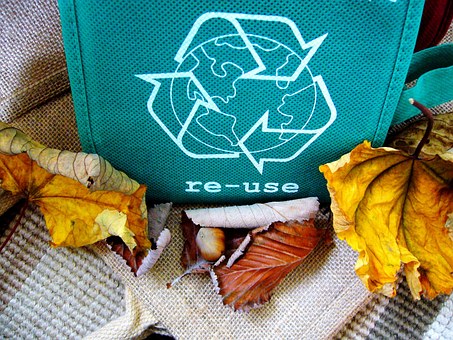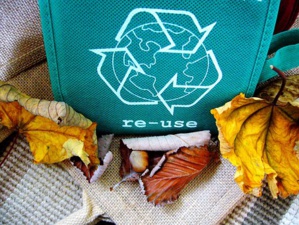Dailycsr.com – 09 April 2017 – According to the leading figure of Veolia in Ireland and the U.K., Estelle Brachlianoff, the days of enjoying the “potential economic and environmental benefits” of the “circular economy” is not for away into the future “it is something happening here and now”.
Brachlianoff claims that “a huge mine of hidden value” waits for the corporate world to tap into. Veolia is a “resource management” firm which was titled the “Business in the Community Responsible Business of the Year” for the year of 2016; whereby in its new report called “Imagine 2050”, it takes up several “new business models”.These models, as per Veolia, would be a requirement, especially in “three sectors” of the U.K. if the latter wants to “meet the ongoing resource and waste challenges between now and 2050”.
The above mentioned three areas are the “manufacturing, pharmaceutical and chemical, and food and drink industries” which create ‘thirteen million tonnes’. However, managing these waste materials properly, through re-manufacturing, re-using and recycling, could generate an economic value of “£4 billion”. According to ‘Imagine 2050’:
“Business models and operations can be re-engineered and redesigned by 2050 so that products and manufacturing processes are completed by closing the loop. By generating energy from renewable sources and no longer treating water as a cheap commodity, but a valuable resource, businesses will become more self-sufficient”.
In Brachlianoff’s words:
“We’re investing in R&D right now, developing solutions with our customers and building partnerships with like minded people”.
The manufacturing unit could have a benefit of “£2.8 billion” through “under-utilised waste streams”, whereby “recovering energy and water resources”. As per the company’s prediction, by the year of 2050, waste material would become a “tradable commodities” which has the potential of “enabling 100% recovery rates”.
While, the University of Cambridge’s Director Steve Evans, says that an additional “£6 billion” could be generated by just becoming “more efficient” through less usage of “water, energy and gas”. In his words:
“Non-labour resources cost five times as much as labour in manufacturing and we need to improve skills and knowledge across the board”.
Similarly, when it comes to the pharma area, one is looking at an “extra value” of “£800 million” just by infusing “efficiency” in the product designing. In this manner, the sector could contribute in shaping “new finance models”. Eventually, the food industry could be subject to “major changes” under “cost pressures” as companies will be pushed into thinking of new ways. According to Evans:
“We’re already growing enough to feed the future world. We just don’t feed people with it. We don’t need to grow more stuff; we just need to stop throwing away the edible stuff that we do grow”.
Nevertheless, there is a gap-between the acceptance towards “circular economy principles” and the “closed loop developments”, as the Environmental Programme Manager at BMW, Thomas Sherifi, added:
“There’s no doubt, the circular economy is going to be hugely important to our business. No longer are cars these beautiful, shiny things that sit on our driveways. We need to think more about what happens at the end of their life and the recyclability of all of the components – and we are doing that”.
While, Brachlianoff suggests a re-writing of the “rulebook”, Sherifi admits:
“Innovation is what drives our business, and we are reluctant to share that. To let that Pandora out of the box is a big decision for the big bosses”.
Therefore, Evans thinks collaboration alone can be the saviour and the Senior Vice-president and the Head of Business Applications Services at Fujitsu, Ravi Krishnamoorthi, warns:
“Uber exists because there was a reluctance to collaborate. There must be a culture change from business leaders if we are to do business in a circular way.”
In Brachlianoff’s words:
“It was only when the environment lead at one of our customers started reporting to the chief finance officer that the true environmental costs of inaction were translated to the board”.
“Climate change impacts are taking a hold now and having an impact on quarterly performance. There’s no time to wait”.
Referring to “Riversimple and Tesla”, Sherifi says:
“We need to redefine what ‘cool’ is”.
Evans’ prediction sees “a shift” in the business tradition in the next five years’ time. He says:
“Increasingly we will see companies redefining what ‘winning’ means: winning at the expense of another company, as is the case now, or winning together”.
References:
http://www.ethicalperformance.com
Brachlianoff claims that “a huge mine of hidden value” waits for the corporate world to tap into. Veolia is a “resource management” firm which was titled the “Business in the Community Responsible Business of the Year” for the year of 2016; whereby in its new report called “Imagine 2050”, it takes up several “new business models”.These models, as per Veolia, would be a requirement, especially in “three sectors” of the U.K. if the latter wants to “meet the ongoing resource and waste challenges between now and 2050”.
The above mentioned three areas are the “manufacturing, pharmaceutical and chemical, and food and drink industries” which create ‘thirteen million tonnes’. However, managing these waste materials properly, through re-manufacturing, re-using and recycling, could generate an economic value of “£4 billion”. According to ‘Imagine 2050’:
“Business models and operations can be re-engineered and redesigned by 2050 so that products and manufacturing processes are completed by closing the loop. By generating energy from renewable sources and no longer treating water as a cheap commodity, but a valuable resource, businesses will become more self-sufficient”.
In Brachlianoff’s words:
“We’re investing in R&D right now, developing solutions with our customers and building partnerships with like minded people”.
The manufacturing unit could have a benefit of “£2.8 billion” through “under-utilised waste streams”, whereby “recovering energy and water resources”. As per the company’s prediction, by the year of 2050, waste material would become a “tradable commodities” which has the potential of “enabling 100% recovery rates”.
While, the University of Cambridge’s Director Steve Evans, says that an additional “£6 billion” could be generated by just becoming “more efficient” through less usage of “water, energy and gas”. In his words:
“Non-labour resources cost five times as much as labour in manufacturing and we need to improve skills and knowledge across the board”.
Similarly, when it comes to the pharma area, one is looking at an “extra value” of “£800 million” just by infusing “efficiency” in the product designing. In this manner, the sector could contribute in shaping “new finance models”. Eventually, the food industry could be subject to “major changes” under “cost pressures” as companies will be pushed into thinking of new ways. According to Evans:
“We’re already growing enough to feed the future world. We just don’t feed people with it. We don’t need to grow more stuff; we just need to stop throwing away the edible stuff that we do grow”.
Nevertheless, there is a gap-between the acceptance towards “circular economy principles” and the “closed loop developments”, as the Environmental Programme Manager at BMW, Thomas Sherifi, added:
“There’s no doubt, the circular economy is going to be hugely important to our business. No longer are cars these beautiful, shiny things that sit on our driveways. We need to think more about what happens at the end of their life and the recyclability of all of the components – and we are doing that”.
While, Brachlianoff suggests a re-writing of the “rulebook”, Sherifi admits:
“Innovation is what drives our business, and we are reluctant to share that. To let that Pandora out of the box is a big decision for the big bosses”.
Therefore, Evans thinks collaboration alone can be the saviour and the Senior Vice-president and the Head of Business Applications Services at Fujitsu, Ravi Krishnamoorthi, warns:
“Uber exists because there was a reluctance to collaborate. There must be a culture change from business leaders if we are to do business in a circular way.”
In Brachlianoff’s words:
“It was only when the environment lead at one of our customers started reporting to the chief finance officer that the true environmental costs of inaction were translated to the board”.
“Climate change impacts are taking a hold now and having an impact on quarterly performance. There’s no time to wait”.
Referring to “Riversimple and Tesla”, Sherifi says:
“We need to redefine what ‘cool’ is”.
Evans’ prediction sees “a shift” in the business tradition in the next five years’ time. He says:
“Increasingly we will see companies redefining what ‘winning’ means: winning at the expense of another company, as is the case now, or winning together”.
References:
http://www.ethicalperformance.com


 According To Veolia’s Brachlianoff, ‘Circular Economy’ Is An Ongoing Movement As Oppose To A Dream Of a Distant Future
According To Veolia’s Brachlianoff, ‘Circular Economy’ Is An Ongoing Movement As Oppose To A Dream Of a Distant Future





 Companies
Companies